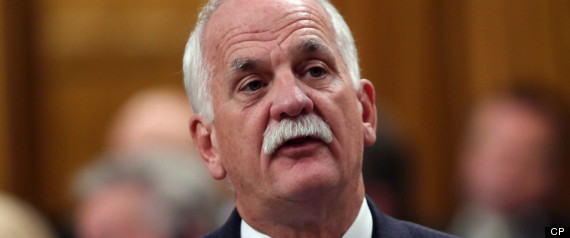 OTTAWA - In a highly unusual move, a federal judge has ordered Public Safety Minister Vic Toews to accept the transfer to Canada of a prisoner serving his sentence in a U.S. jail — saying the minister only "paid lip service" to a previous ruling.
OTTAWA - In a highly unusual move, a federal judge has ordered Public Safety Minister Vic Toews to accept the transfer to Canada of a prisoner serving his sentence in a U.S. jail — saying the minister only "paid lip service" to a previous ruling.Federal Court Justice Luc Martineau has given Toews 45 days to approve the transfer request of Yves LeBon, a Quebec man currently in a Georgia prison for cocaine possession.
Martineau concluded Toews "wanted to punish" LeBon, who has a wife and son in Boisbriand, Que., because he was caught transporting a large quantity of drugs and did not provide the names of his accomplices.
"The minister has shown a bias and has ignored the clear evidence on record supporting a transfer," Martineau wrote in his judgment made public Friday.
"The continued refusal of the applicant's transfer request has had a serious impact on him, including alienation from his family and support network, frustration of his rehabilitation and deprivation of superior programming in a Canadian prison."
Yavar Hameed, LeBon's lawyer, said Friday that Toews' attitude flies in the face of the desire of lawmakers to see offenders rehabilitated and eased back into society.
"I think it's indicative of the moralistic resistance that the minister has to abiding by the clear intent of Parliament," Hameed said.
The Conservatives have taken a much tougher stand on transfer approvals than previous governments, prompting numerous court cases.
LeBon entered New York state by car in August 2007 and was stopped in Illinois a few days later by a state trooper who discovered 119 kilograms of cocaine inside the vehicle.
He was sentenced to 10 years in prison and five additional years of supervised release after pleading guilty to possession with intent to distribute the drug and improper entry into the U.S.
LeBon spent time behind bars in Pennsylvania, but was recently moved to Georgia, said Hameed.
In March 2009, U.S. authorities approved his request for a move to a Canadian facility under the International Transfer of Offenders Act, but the following year Toews turned his application down.
In weighing such requests, the minister is supposed to consider whether the offender's return to Canada would constitute a security threat, the chance he might commit a "criminal organization" offence and whether he has social ties or family in Canada, among other factors.
Last April the Federal Court of Appeal found Toews' decision was unreasonable and ordered him to reconsider his refusal. But the minister again turned LeBon down.
The latest ruling says Toews basically reasserted his previous reasoning to support his opinion that LeBon was likely to commit an organized crime offence — despite extensive new evidence to the contrary "favouring rehabilitation and an absence of risk."
Martineau noted Toews was not swayed by updated assessments by the Correctional Service of Canada, the RCMP and Canadian Security Intelligence Service.
Toews acknowledged points in LeBon's favour — that it was his first offence, along with his strong social ties, his good behaviour in prison and the fact his sentence was reduced for admitting responsibility.
But the minister said there was an "important risk" that LeBon would commit an organized crime offence, inferring from the distance he drove and the quantity of drugs that at least two other people were involved in an apparent illicit transaction. He also noted LeBon refused to name his accomplices in his transfer application and did not provide a declaration to police after his arrest.
The judge found the minister's reasoning "spurious, illogical, speculative and not evidence-based." He said there was no evidence on which to conclude LeBon was anything more than a drug mule.
Martineau also pointed out there is evidence, based on LeBon's U.S. prison record, that he has no intention of further involvement in any criminal conspiracy.
In addition, the judge rejected the notion LeBon's transfer would discredit the administration of justice in Canada, as Toews had claimed.
"I do not believe that on the guise of the 'administration of justice,' the minister can refuse a transfer request because an applicant is not willing to act as an information for the police or jail authorities," Martineau wrote.
Under the judge's order, Toews must confirm in writing to LeBon that all reasonable steps have been taken for his prompt transfer to a Canadian correctional facility.
Julie Carmichael, a spokeswoman for Toews, said the minister's office was reviewing the decision and that it would be inappropriate to comment further.
Original Article
Source: huffington post
Author: Jim Bronskill
No comments:
Post a Comment